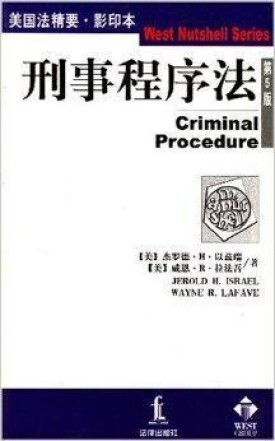刑事程序法
伊斯雷爾、拉弗維所著的書籍
《刑事程序法》是1999年10月1日法律出版社出版的一本書籍,頁數為449頁。
在美國法律教育界與律師實務界,“美國法精要”是頗具特色的一套書,其特點是簡捷明快、深入淺出。美國法學院的學生將其作為課外教材,由此掌握美國各主要部門法的精義;執業律師也經常藉助這套書,以迅速了解某些部門法的相關情況。我國的讀者通過閱讀原汁原味的英文來學習美國法律,可有效提高法律英語水平,促進與美國同行的對話與交流。
作者:(美國)伊斯雷爾(美國)拉弗維
傑羅德·H·以茲瑞:密執安大學法學院榮譽退休教授,全美最知名的刑事訴訟法理論權威之一。
威恩·R·拉法吾:曾任伊利諾伊大學法學院院長,現為該院榮譽退休教授。
總 序
總 序
在美國法律教育界與律師實務界,這套“美國法精要”(Nutshell Series)是頗具特色的一套小書。這套書最突出的特點當推它們的簡捷明快、深入淺出。每種書均由富有教學經驗的法學院教授執筆,在三、四百頁的篇幅內集中介紹某一法律部門的基本原理、主要法規和重點案例。
由於這些特點,這套叢書受到了無數美國讀者的歡迎和喜愛。眾多法學院的學生將這套書作為課外的輔助教材,由此掌握美國各主要部門法的精義。執業律師也經常藉助這套書,以迅速了解自己尚未熟習的某些部門法,或者溫習過去曾經學過的某些課程。
相信這套書也能贏得國內讀者的歡迎。無論是法律專業的本科生、研究生,還是執業律師或其他人士,都能從這套叢書中獲得有關美國法律的大量知識,對自己的學習和工作有所助益。此外,通過閱讀原汁原味的英文來學習美國法律也應能提高讀者的法律英語水平,促進與美國同行的對話和交流。
應原出版者的要求,這套叢書的國內版增加了中文前言,以介紹美國部門法的概況、每種書的內容及原書作者。這些前言作者都是在美國受過專業教育或從事專門研究的中國法律學者甚或專家。相信他們的介紹會對讀者有所幫助。
Happy reading!
1999年4月
於哈佛法學院
PREFACE
TABLE OF CASES
Chapter 1 The Constitutionalization of Criminal Procedure
Chapter 2 Arrest,Search and Seizure
Chapter 3 Wiretapping,Electronic Eavesdropping,and the Use of Secret Agents
Chapter 4 Police Interrogation and Confessions
Chapter 5 Lineups and Other Pretrial Identification Procedures
Chapter 6 The Exclusionary Rules and Their Application
Chapter 7 Right to Counsel
Chapter 8 The Post-Investigatory Process:From Bail to Appellate Review
書摘
(b) Restricting Linkletter: Full retroactivity
prior to conviction finality
Starting with U.S.v. Johnson (1982), a series of cases overturned Linkletter as to proceedings that had not yet reached the point where a conviction became final. Johnson held that full retroactivity was required prior to the point of conviction finality as to new Fourth Amendment rulings. Sheav.La (1985) held that this requirement was not limited to Fourth Amendment rulings, and Griffith v.
Ky: (1987) held that it applied even where the new ruling constituted a "clear break" from past precedent. For the purpose of this line of cases, a conviction did not become final until "the availability of appeal [was] exhausted and the time for a petition for certiorari [to the Supreme Court] elapsed or a petition was denied." Thus, a new ruling was now given retroactive effect (1) to all
cases that came to trial after the date of the new ruling even if the operative event had occurred beforehand, and (2) to prior adjudications that had
resulted in a conviction where the opportunity for direct appellate review (through to petition for certiorari) was still available.
The Johnson line of cases offered several reasons for rejecting the Linkletter analysis insofar as it applied to cases not yet final. To fail to apply a newly adopted rule to a prosecution that had not yet come to trial or was still pending upon direct appellate review would be contrary to "basic norms of constitutional adjudication." It undermines the integrity of judicial review to "simply fish * * * one case from the stream of appellate review, using it as a vehicle for pronouncing new constitutional standards, and then permitting a stream of similar
cases subsequently to flow by unaffected by the new rule." So too, such selective application of the new rule was said to violate "the principle of treating similarly situated defendants the same." As earlier critics had noted, giving the benefit of the new rule to the defendant whose case constituted the vehicle for announcing the rule and denying it to others whose cases were at the same stage
could result in "different standards for the protection of constitutional rights * * * [being] applied to two defendants simultaneously tried in the same courthouse for similar offenses." Dissenters maintained that the lihe the majority was drawing, between final and non-final cases, was equally based on the fortuity of timing and produced an inequality in the treatment of like cases as great as
that which arose under the Linkletter approach.The Court majority, however, found a greater sense of consistency provided where the distinction was tied to an appellate court's responsibility "to resolve all cases before us on direct review in light of our best understanding of governing constitutional principle."
